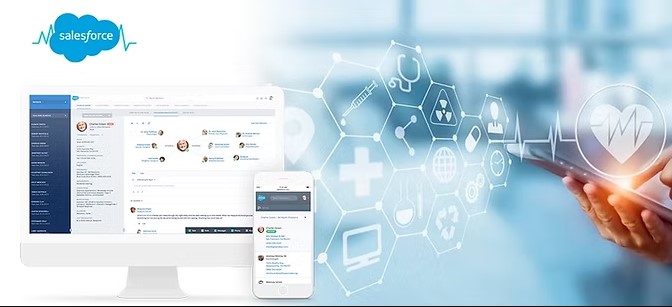In today’s fast-paced digital world, healthcare organizations are under immense pressure to provide better patient experiences, streamline operations, and meet regulatory demands. Salesforce, a leading CRM platform, has stepped up to transform how healthcare providers, payers, and life sciences companies engage with patients and manage their internal workflows.
With the introduction of Salesforce Health Cloud, the platform is specifically tailored to meet the unique needs of the healthcare industry. Let’s explore how Salesforce for healthcare is revolutionizing patient care, improving operational efficiency, and ensuring better outcomes.
What Is Salesforce for Healthcare?
Salesforce for healthcare refers primarily to Salesforce Health Cloud, a patient relationship management solution built on the Salesforce platform. It brings together clinical and non-clinical data into a single, secure platform, helping providers offer connected, personalized, and efficient care.
It integrates with EHRs, medical devices, and third-party systems, making it easier for healthcare teams to access complete patient profiles, communicate effectively, and deliver value-based care.
Key Benefits of Salesforce for Healthcare
1. 360-Degree Patient View
One of the core advantages of Salesforce Health Cloud is its ability to unify patient data from various sources. Providers can see not just clinical records, but also appointment history, preferences, social determinants of health, and caregiver relationships. This complete view allows for personalized and proactive care delivery.
2. Improved Care Coordination
Healthcare often involves multiple touchpoints—primary care, specialists, labs, pharmacies, and insurers. Salesforce Health Cloud improves communication and collaboration among care teams, helping them coordinate better. Shared care plans, task assignments, and secure messaging features reduce miscommunication and ensure continuity of care.
3. Enhanced Patient Engagement
Modern patients expect more from their healthcare experience. Salesforce enables personalized outreach through email, SMS, and mobile apps. Providers can use marketing automation tools to share preventive care tips, appointment reminders, and follow-up messages. This keeps patients engaged and improves adherence to treatment plans.
4. Compliance and Data Security
Healthcare organizations must comply with strict regulations like HIPAA. Salesforce Health Cloud includes enterprise-grade security, role-based access controls, and audit trails to ensure data protection. It also supports consent management, making it easier to maintain regulatory compliance.
5. Faster Onboarding and Referrals
Salesforce streamlines patient onboarding by digitizing forms, approvals, and insurance verifications. It also simplifies referral processes between providers with real-time updates, automated workflows, and secure data transfers. This minimizes delays and enhances the patient experience.
Top Use Cases of Salesforce in Healthcare
1. Patient Relationship Management
Just as businesses use CRM to manage customers, healthcare providers use Salesforce to build stronger patient relationships. From scheduling and intake to discharge and follow-up, every interaction is logged and used to enhance patient satisfaction and outcomes.
2. Chronic Disease Management
For patients with conditions like diabetes or hypertension, continuous engagement is key. Salesforce helps care teams monitor patient progress, send reminders for tests or medications, and adjust care plans in real time. It ensures patients don’t fall through the cracks.
3. Home Healthcare and Telemedicine
Salesforce supports mobile healthcare delivery by enabling field workers and telehealth providers to access patient data on the go. Integration with video conferencing tools and wearable devices ensures seamless remote monitoring and communication.
4. Healthcare Marketing Automation
Healthcare marketers use Salesforce tools like Marketing Cloud and Pardot to run HIPAA-compliant campaigns that drive engagement, appointment bookings, and educational outreach. Behavioral data and segmentation help personalize the messaging.
5. Provider and Payer Collaboration
Payers and providers can use Salesforce to streamline prior authorizations, claims processing, and appeals. The shared platform reduces friction and accelerates approvals, benefiting both the business and the patient.
Salesforce for Healthcare: Who Should Use It?
Salesforce isn’t just for large hospital networks. It’s suitable for:
- Hospitals & Clinics: For centralized patient management and care coordination
- Health Insurance Providers: For better member engagement and case management
- Medical Device Companies: For managing provider relationships and service requests
- Home Care & Hospice Services: For scheduling, task tracking, and field reporting
- Mental Health & Wellness Centers: For managing treatment plans and client communication
Whether you’re in acute care, behavioral health, or elder care, Salesforce provides the flexibility and scalability you need.
Final Thoughts
As healthcare continues its digital transformation journey, the need for connected, patient-centered care has never been greater. Salesforce for healthcare offers the tools needed to enhance engagement, improve coordination, and drive better health outcomes.
By adopting Salesforce Health Cloud and its integrated solutions, healthcare organizations can stay ahead of industry changes, deliver exceptional care, and build lasting patient relationships. If you're looking to modernize your systems and elevate patient experience, Salesforce is the partner you can trust.





Comments